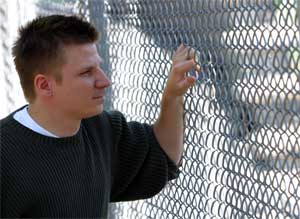 |
| PhD student Marcus Juodis hopes to talk to offenders who've been on the run from police. (Pearce photo) |
With thousands of people on outstanding warrants in Canada right now, Dalhousie psychology student Marcus Juodis is trying to find the answers to those questions. He recently received $60,000 from the Social Sciences and Humanities Research Council of Canada (SSHRC) to probe the decision-making strategies of offenders who have evaded arrest by police for extended periods of time.
ÒWhen IÕve asked the police what their strategy is for finding people, they basically shrug and say itÕs luck,” says Mr. Juodis, whose supervisor is Dalhousie professor Steve Porter, one of CanadaÕs leading forensic psychologists.
ÒI think we can do better than that. IÕm in a field devoted to studying patterns and developing typical profiles of offenders based on interviews with people who have committed similar crimes in the past. So, can I attempt a similar strategy and talk to guys whoÕve been on the run in the past in order to find similar patterns of behavior and make guesses about the behaviors of criminals who are on the run now?”
Mr. Juodis, 24, got the idea for his doctoral thesis while an undergraduate student at the University of Western Ontario working with the police service in London, Ont. At the time, police were on the lookout for a man who broke into a womanÕs basement apartment and sexually assaulted her. Fingerprints on a knife left at the crime scene pinpointed a suspect and police staked out the manÕs home to make the arrest.
|
During the four months the fugitive was on the run, police issued regular bulletins asking for the publicÕs help and urging the man to turn himself in. The public responded by providing hundreds of tips, most of which went nowhere.
ÒThis is when I asked the police, ÒWell, whatÕs the plan?” recalls Juodis. ÒTheyÕre basically waiting Ñ for him to make contact with family, get in touch with an ex-girlfriend or get picked up for something else, like a traffic violation. ItÕs luck essentially.”
ThatÕs when Mr. Juodis had his Eureka moment: ÒIf youÕre a fugitive, your needs donÕt change. You still need food, shelter, perhaps drugsÉ I think thereÕs an educated guess to be made on what these people do when theyÕre evading arrest. Hopefully studies with these offenders can back up these guesses.”
HeÕs planning on interviewing offenders who made the RCMPÕs most-wanted list and have since been apprehended. He suspects the offenders might not mind sharing what they know: ÒI think theyÕll be eager to tell someone how they fooled police.”
HeÕll be interested in how theyÕre able to cross borders, why they pick one city over another, and if and how they change their appearance.
In the case of the London fugitive, he never left the city and was picked up by police in a mall food court, acting on information by a passerby who recognized his headshot. The man, sporting long hair and a goatee in contrast to reports which suggested his head was shaved, had been on the run for three months.
ÒThere are so many questions that need answers, because this is one area virtually untouched.”
Brushing aside the inevitable jokes about the one-armed man, Mr. Juodis thinks his research will be able to help police.
ÒThese kinds of things cause the public a lot of stress. ThereÕs a certain amount of powerlessness that is felt and I want to be able to do something about that.”
SEE STORY: Researcher gets paid to think like a criminal (Story by Charles Mandel for CanWest News Service)
Comments
comments powered by Disqus
